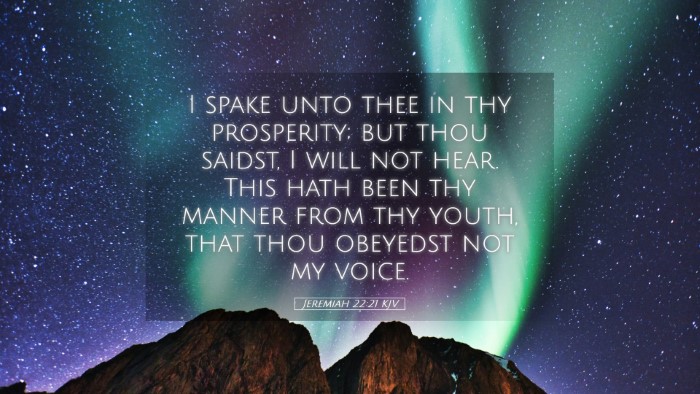Commentary on Jeremiah 22:21
Jeremiah 22:21 states: "I spake unto thee in thy prosperity; but thou saidst, I will not hear. This hath been thy manner from thy youth, that thou obeyedst not my voice." This verse encapsulates a critical moment in the prophetic ministry of Jeremiah, highlighting the persistent disobedience of Judah, despite the blessings they received from God.
Contextual Overview
Before delving into the individual commentaries, it is necessary to understand the broader context of Jeremiah's prophecies. The prophet Jeremiah, often referred to as the "weeping prophet," was called to deliver messages of warning and judgment to the people of Judah during a time of impending doom due to their continued idolatry and rebellion against God's commands.
Insights from Matthew Henry
Matthew Henry highlights the significance of divine communication in the verse. He observes:
- Divergence from God: Henry points out that God spoke to Judah during their time of prosperity, signifying His grace and mercy. The people's subsequent refusal to heed God's voice illustrates a tragic turning away from divine instruction.
- Historical Consistency: He notes that this rebellion was not a new phenomenon; it was a persistent pattern since their youth. This ongoing disobedience emphasizes a deep-rooted issue within the nation’s relationship with God.
- The Consequence of Neglect: Henry argues that neglecting God’s voice during favorable circumstances can lead to severe repercussions. He stresses the importance of acknowledging and responding to God’s guidance, particularly in times of blessing.
Reflections from Albert Barnes
Albert Barnes provides a practical analysis of the verse, focusing on the implications for Israel. He interprets:
- Spiritual Hearings in Prosperity: Barnes argues that prosperity often leads to spiritual complacency, where blessings can obscure the need for vigilance and obedience. The Israelites, during their prosperous periods, ignored messages meant to caution them against future calamities.
- Rejection of Divine Counsel: He points out that the refusal to listen to God’s counsel reflects a heart hardened against divine wisdom. This can serve as a global lesson about the human condition—sometimes, the very comforts we enjoy can lead us away from seeking God earnestly.
- Youthful Disobedience: Barnes comments on the phrase "from thy youth," indicating an ingrained habit of disobedience. He encourages believers to examine their past and recognize patterns that may lead to spiritual failure, often rooted in early life experiences.
Exegesis by Adam Clarke
Adam Clarke offers exegetical insights into this verse, emphasizing the nature of God’s communication and human responses:
- God's Initiation: Clarke emphasizes that God takes the initiative to communicate even when His people are seemingly indifferent. This speaks volumes of God's character—loving, patient, and long-suffering.
- Covenantal Relationship: He notes the covenantal implications of disobedience. The Israelites had a unique relationship with God, marked by covenant. Their refusal to listen suggests not just disobedience but a breach of that sacred covenant.
- Implications for Today: Clarke further relates this to contemporary witnesses of faith, urging them to recognize how the prosperity of their lives should serve as a motivation to remain obedient and attentive to God's voice.
Consolidated Themes and Application
The analysis of Jeremiah 22:21 across these commentaries reveals several key themes that are vital for contemporary application:
- The Peril of Prosperity: In times of abundance, believers must remain vigilant against complacency and the temptation to disregard divine guidance.
- Historical Patterns of Behavior: Recognizing and breaking the cycles of disobedience is crucial for spiritual growth. Believers are encouraged to reflect on their spiritual journeys to identify and overcome similar patterns.
- The Importance of Listening: God desires an active relationship with His followers. Regularly seeking His counsel and being receptive to His voice is essential in maintaining this relationship.
- Consequences of Neglect: Ignoring God’s voice can lead to dire consequences. Pastors, theologians, and scholars must emphasize the importance of obedience as a protective measure against spiritual decline.
Theological Implications
The theological implications of Jeremiah 22:21 are profound. This scripture serves as a reminder of God's relentless pursuit of His people, even when they turn away:
- The Nature of Divine Patience: God's patience is a testimony to His love, yet it has its limits. The eventual calamity facing Judah serves as a warning to all generations about the seriousness of disobedience.
- The Call to Reflect: The verse urges a deep reflection on personal and corporate responses to God's voice. It calls for introspection about how prosperity might be distracting believers from faithful obedience.
- Commitment to Covenantal Faithfulness: Understanding the covenantal aspect of God’s relationship with humanity can enrich theological discussions and encourage deeper levels of commitment within the community of faith.
Conclusion
Jeremiah 22:21 provides a rich tapestry of insights that are relevant to modern readers. By engaging with the commentaries of Matthew Henry, Albert Barnes, and Adam Clarke, pastors, students, theologians, and scholars are invited to explore the intersections of prosperity, obedience, and spiritual discernment. The themes extracted from this verse serve as vital reminders for cultivating a responsive heart towards God's voice amidst life's complexities.


